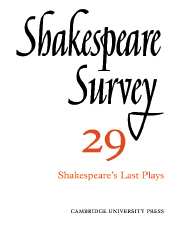Book contents
- Frontmatter
- Shakespeare’s Romances since 1958: A Retrospect
- Puzzle and Artifice: The Riddle as Metapoetry in ‘Pericles’
- ‘Pericles’ in a Book-List of 1619 from the English Jesuit Mission and Some of the Play's Special Problems
- George Wilkins and the Young Heir
- Theatrical Virtuosity and Poetic Complexity in ‘Cymbeline’
- Noble Virtue in ‘Cymbeline’
- Directing the Romances
- Shakespeare and the Ideas of his Time
- The Letter of the Law in ‘The Merchant of Venice’
- Shakespeare’s Use of the ‘Timon’ Comedy
- Re-enter the Stage Direction: Shakespeare and Some Contemporaries
- The Staircases of the Frame: New Light on the Structure of the Globe
- Shakespeare in Max Beerbohm’s Theatre Criticism
- A Danish Actress and Her Conception of the Part of Lady Macbeth
- Towards a Poor Shakespeare: The Royal Shakespeare Company at Stratford in 1975
- The Year's Contributions to Shakespearian Study 1 Critical Studies
- 2 Shakespeare’s Life, Times, and Stage
- 3 Textual Studies
- Index
- Plate Section
Shakespeare’s Romances since 1958: A Retrospect
Published online by Cambridge University Press: 28 March 2007
- Frontmatter
- Shakespeare’s Romances since 1958: A Retrospect
- Puzzle and Artifice: The Riddle as Metapoetry in ‘Pericles’
- ‘Pericles’ in a Book-List of 1619 from the English Jesuit Mission and Some of the Play's Special Problems
- George Wilkins and the Young Heir
- Theatrical Virtuosity and Poetic Complexity in ‘Cymbeline’
- Noble Virtue in ‘Cymbeline’
- Directing the Romances
- Shakespeare and the Ideas of his Time
- The Letter of the Law in ‘The Merchant of Venice’
- Shakespeare’s Use of the ‘Timon’ Comedy
- Re-enter the Stage Direction: Shakespeare and Some Contemporaries
- The Staircases of the Frame: New Light on the Structure of the Globe
- Shakespeare in Max Beerbohm’s Theatre Criticism
- A Danish Actress and Her Conception of the Part of Lady Macbeth
- Towards a Poor Shakespeare: The Royal Shakespeare Company at Stratford in 1975
- The Year's Contributions to Shakespearian Study 1 Critical Studies
- 2 Shakespeare’s Life, Times, and Stage
- 3 Textual Studies
- Index
- Plate Section
Summary
In his review in 1958 of trends in the critical response to the Romances (Shakespeare Survey 11, 1958) Philip Edwards concluded that we had heard enough about their universality, and boldly called for more ‘mundane’ studies. Many though not all have followed his counsel since; so much so indeed that some may have forgotten how much we owe the current wave of enthusiasm for the Romances to T. S. Eliot and G. Wilson Knight. However perverse or ‘trite’ (Edwards’s word) the universalisers sometimes were, they did stimulate and certainly never hurt anyone. Recent decades have likewise seen many well-received performances of several of the Romances, though Cymbeline remains puzzling to both critics and producers (who therefore seldom risk it), and it is curious how seldom Henry VIII is staged nowadays, considering how popular the play was until fifty years ago.
My survey will attempt to give recent 'mundane' studies the due they deserve but not confine itself to them. But it both should and must be selective. Too much writing on the Romances has anyhow been repetitious or supererogatory, and whoever wishes could write an article on six different recent views of how exactly we should respond, step by step, to the first half of i, ii, or to the final scene of The Winter s Tale. Much is omitted deliberately or hesitantly, though my readers may well wish I had omitted more. I have no room to deal with bibliographical studies or problems of authorship.
- Type
- Chapter
- Information
- Shakespeare Survey , pp. 1 - 10Publisher: Cambridge University PressPrint publication year: 1976

